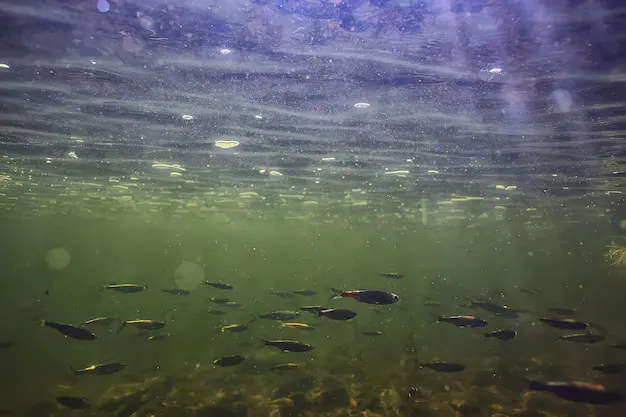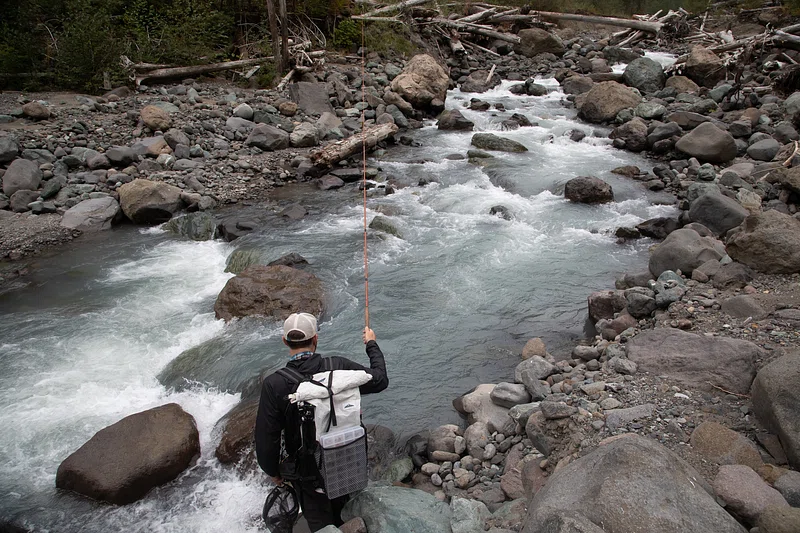
Why Do Fish Keep Stealing My Bait?

8 min read
You cast your line with perfect confidence, feeling that familiar tug of excitement. Thirty minutes later, you reel in nothing but a bare hook and crushed dreams. Sound familiar?
Honestly, there’s nothing more maddening than watching your expensive bait disappear faster than free beer at a dock party. But here’s the thing – those sneaky fish aren’t just messing with you for sport. They’ve got their reasons, and once you understand their game, you can start playing it better.
The Great Bait Heist: What’s Really Going On Down There?
Let me paint you a picture. You’re sitting up there with your coffee, maybe checking your phone, completely unaware that there’s basically an underwater crime syndicate operating right beneath your rod tip. Fish aren’t just randomly grabbing your bait – they’re actually pretty calculated about it.
The truth is, most bait theft happens because we anglers make it way too easy for them. Think about it from a fish’s perspective: free food just hanging there, no strings attached? Well, technically there are strings attached, but you know what I mean.

Small fish are usually the biggest culprits here. Bluegill, perch, and other panfish have perfected the art of bait stealing. They’ll nibble and pick at your worm or dough ball until there’s nothing left but a sad, naked hook. Meanwhile, you’re sitting there wondering why you haven’t had a bite all morning.
But it’s not just the little guys. Sometimes bigger fish will grab your bait and spit it out faster than you can blink. They’re testing it, seeing if it feels right, tastes right, or if something seems off. Smart fish – the ones that have seen a few hooks in their day – they’re extra cautious.
Hook Size Matters More Than Your Ego
Here’s where a lot of us mess up, myself included. We think bigger hooks mean bigger fish, right? Wrong. Dead wrong.
Using a hook that’s too large for your bait is like trying to hide a baseball in a grape. Fish can see that massive hook sticking out, and they’re not idiots. They’ll work around it, steal your bait, and leave you scratching your head.
The general rule? Match your hook size to your bait, not your ambitions. If you’re using small worms or dough balls, go with a size 6 or 8 hook. For corn kernels or small pieces of bread, even smaller. I know it feels wrong – like you’re limiting yourself – but trust me on this one.
Circle hooks are your friend here too. They’re designed to hook fish in the corner of the mouth when they try to swim away, which means less gut-hooking and more successful catches. Plus, they’re harder for fish to steal bait from because of their curved design.
The Art of Bait Presentation (It’s Not Rocket Science, But Close)
You know what separates weekend warriors from serious anglers? How they present their bait. And no, I’m not talking about making it look pretty – I’m talking about making it irresistible while being nearly impossible to steal.
First off, bury that hook. If you’re using worms, thread them properly so the hook point is hidden but the worm still looks natural. With dough baits, mold them around the hook completely. The goal is to make the fish commit to taking the whole thing, not just nibbling around the edges.

Here’s a trick that’s saved me countless trips: use sticky baits. PowerBait, for example, stays on the hook much better than regular dough balls. Same goes for those newer artificial baits that look and smell like the real thing but won’t fall off at the first touch.
And let’s talk about bait size for a second. Bigger isn’t always better, but neither is smaller. You want your bait to be substantial enough that a fish has to commit to taking it, but not so large that they can easily work around it.
Timing and Technique: When Fish Get Sneaky
Fish aren’t stealing your bait randomly – there’s definitely a pattern to their thievery. Early morning and late evening are prime time for bait theft, mainly because that’s when smaller, more aggressive fish are most active.
But here’s where it gets interesting: water temperature plays a huge role too. In colder water, fish move slower and are more deliberate. They’ll mouth your bait, test it, maybe carry it around a bit before deciding whether to swallow it. This gives them plenty of time to figure out something’s not right and spit it out.
In warmer water, fish are more aggressive but also more suspicious. They’ve got faster metabolisms, so they’re hungry, but they’re also more alert to danger. It’s a delicate balance.
Your rod sensitivity matters too. If you can’t feel those light taps and gentle tugs, you’re missing the early warning signs that a fish is working your bait. A good sensitive rod will telegraph every little nibble, giving you a chance to set the hook before they clean you out.
The Waiting Game: Patience vs. Action
This is where fishing gets psychological. You feel that tap-tap-tap on your line, and every instinct screams “set the hook!” But sometimes – and this kills me to admit – patience pays off better than quick reflexes.
Different fish have different feeding behaviors. Bass might grab your bait and run with it, making hook-setting easy. But trout? They’re sneaky. They’ll pick up your bait, swim around with it, maybe drop it and pick it up again. If you set the hook too soon, you’ll pull it right out of their mouth.

The trick is learning to read what’s happening down there through your rod tip. Light tapping usually means small fish picking at your bait – either wait them out or reel in and check your bait. Steady tugging might mean a bigger fish has grabbed it but hasn’t committed yet. A solid thump followed by line movement? That’s your cue to set the hook.
Outsmarting the Bait Thieves
Let me share some battle-tested strategies that actually work. First, try using tougher baits. Whole kernel corn stays on the hook better than pieces. Cut bait from firmer fish holds up longer than soft baits. Even something as simple as letting your worms toughen up overnight can make a difference.
Multi-hook rigs can be game-changers too. A simple dropper rig with two hooks gives fish multiple targets, and if they steal bait from one hook, you’ve still got the other working. Just make sure you’re following local regulations about hook limits.
Another trick: use different baits on different hooks. Maybe corn on one, a worm on another. Fish have preferences, and you’re covering more bases this way. Plus, it gives you real-time feedback about what’s working.
Don’t overlook scent either. Fish rely heavily on smell, especially in murky water. Adding scent to your bait makes it more attractive, but it also helps mask any human scent that might make fish suspicious.
When All Else Fails: Switch Up Your Game
Sometimes the fish are just winning, and you need to completely change your approach. If they’re stealing soft baits, try hard baits like corn or pellets. If they’re picking apart your worms, switch to cut bait or artificial lures.
Location matters too. If fish are stealing bait in shallow water, try deeper spots where bigger, less finicky fish might be hanging out. Sometimes moving just 20 feet can make all the difference.
And here’s something most people don’t think about: check your line. Old, visible line makes fish suspicious. Fresh, low-visibility line lets them focus on the bait instead of wondering why there’s a thick rope attached to their dinner.
The seasonal aspect is huge too. Spring fish are hungry after winter and less picky about bait presentation. Summer fish are well-fed and more selective. Fall fish are feeding heavily before winter, but they’re also smarter from months of avoiding hooks.
The Bottom Line: It’s All About Adaptation
Look, bait theft is part of fishing. Even the pros deal with it. The difference is they adapt quickly instead of stubbornly sticking with what’s not working.
Keep a variety of baits with you. Different hook sizes. Multiple rod setups if possible. The fish are constantly changing their behavior based on weather, water conditions, and fishing pressure. You should be changing yours too.
Most importantly, don’t let bait theft ruin your day. Yeah, it’s frustrating, but it’s also information. Every stolen bait tells you something about what’s happening underwater. Use that knowledge, adjust your approach, and get back after them.
Remember, fishing isn’t just about catching fish – it’s about outsmarting them. And trust me, when you finally figure out their game and start consistently hooking fish that used to steal your bait, there’s no better feeling in the world.
The fish might be clever, but we’ve got opposable thumbs and the ability to learn from our mistakes. That’s got to count for something, right?


